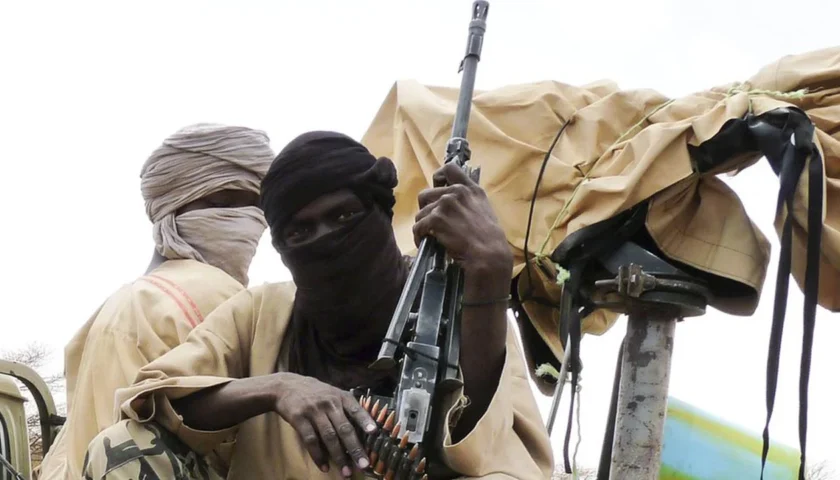L-R: Mr Dele Alake, Bill Gates, President Bola Ahmed Tinubu, Mr Aliko Dangote and Mr Femi Gbajabiamila during the recent visit of Gates in Nigeria
The co-chairman of the Bill and Melinda Gates Foundation, Mr. Bill Gates, has said that Nigeria spends a paltry $10 (about N6, 900) per person on healthcare annually. Gates stated this yesterday in Lagos while speaking at the Pan-African Youth Innovation Forum held under the theme “Advancing Africa: Unleashing the power of youth in science and innovation.”
The hybrid in-person and online event was co-hosted by the Lagos Business School and Co-Creation Hub (CcHub), in partnership with Africa.com and Channels Television. Gates, who was visiting Nigeria for the first time since 2018, said poor investment in the health sector is part of the challenges limiting the potential of many Nigerians.
“It may not surprise you that Nigeria’s state and the federal government only spend the equivalent of $10 on health per person each year, compared to $31 in sub-Saharan Africa. Leaders need to make a much bigger financial commitment, focusing most on improving primary health systems.
“Making sure clinics are well-staffed and supplied, making sure children get the vaccines they need—all of these is essential to improving health and opportunity and unlocking all of Nigeria’s potential,” he said.
He advised the Nigerian government to improve its investment in equitable solutions and in the people who are working on them. He noted that Nigeria is full of talented people with many potential but it would be hard to realise “if they don’t have access to the most basic building blocks of life.”

Gates promised to speak with the government about increasing agricultural and digital financial systems commitments. During his interaction with youth innovators, Gates encouraged them to see opportunities in challenges.
He said Nigerian youths have shown how passionate they are about progress but need to encourage their leaders to follow through on these commitments.
“The last time I visited Nigeria in 2018, I spoke to government leaders about your country’s potential for growth. This time, I wanted to speak also with you: Nigeria’s next generation of innovators.
“Ever since I was a teenager, writing computer code on a terminal at my high school and later at Microsoft, I have loved the feeling of innovating to make something a little better for people—or a lot better.
“I’m sure you know this feeling too. There’s going to be a lot of opportunity for you to continue to make a difference in the world because of the unprecedented potential of new technologies.
“However, Nigerians are still facing many of the challenges I talked about five years ago—and you have to contend with economic instability and security threats.
“I have a lot of faith that your generation will persevere and improve lives throughout Nigeria and beyond,” he said. He further stated that when it comes to making the world a better place talented young people are the most powerful assets.
He noted that Nigeria’s huge youth population represents many potential skills and passion for solving big problems. “Nigeria has one of the biggest youth populations in the world, and it’s growing fast. That represents a lot of potential skills and passion to solve big problems.”
Gates also stressed that progress had not been equally distributed, highlighting poor digital access for many Nigerians and inconsistent availability of health services, education, and employment – especially for women.
“I’m a huge believer in the power of science and innovation to help people lead long, healthy lives. But one of the big lessons I’ve learned is that the benefits don’t automatically reach everyone. To do that, the people creating new breakthroughs, the people funding them, and the people getting them into the world all need to prioritise equity,” he added.
He disclosed that he met some impressive Nigerians whom the Gates Foundation has partnered with for years. “These scientists are improving seeds, fertiliser, and bio-pesticides so farmers can thrive in climate change and grow crops free of toxins. And I met with a researcher scaling up an effective way to reduce anaemia in pregnant women,” he said.
The philanthropist said young people need a strong support system to thrive, starting with education. To do that, the people creating breakthroughs, funding them, and getting them into the world all need to prioritise equity,” he said.
The philanthropist said many exciting innovations in the global pipeline would improve lives here in Nigeria.
“They’re going to prevent infectious diseases, provide life-saving interventions for mothers and babies; make food more nutritious, and give women more convenient contraception options. Down the road, artificial intelligence (AI) will be applied to bring quality healthcare and education to more people,” he added.





